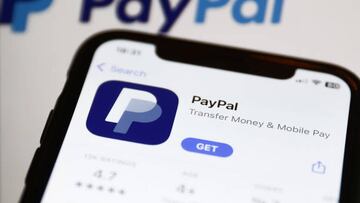When does the IRS start reporting on Venmo and PayPal payments over $600?
A change to the tax code could will soon require income made over $600 on third parties like eBay or paid through Venmo be reported to the IRS.

The 2021 American Rescue Plan (ARP) included changes in the tax code that could have serious impacts on micro-and-small businesses across the country.
Businesses that receive more than 200 sales valued at $20,000 or more through Venmo or Paypal are required to report these earnings to the IRS. The ARP included a measure to lower the income level to $600 and expanded the rule to cover income from other third-party platforms that allow users to sell goods and services like Poshmark, eBay, Rover, Esty, and more.
The rule change has yet to go into effect because late last year, the IRS reversed course and opted to maintain the current limit -- 200 exchanges with a sum no greater than $20,000.
The number of people who sell goods or services as a way to provide additional income to cover basic needs is unknown. Regardless, this move could be seen as a violation of President Biden’s promise not to increase taxes for those making under $400,000 a year.
This decision raises many questions.
Does someone on an online second market shop like Poshmark, who makes $1,000 (less than $100 a month) in their online store each year, have to report that as income?
Washington’s strategy to crack down on tax evasion
President Biden’s administration and congressional Democrats have talked a lot about tackling the issue of tax evasion by wealthy individuals and corporations. But this rule change would not impact those groups.
Conversely, it could lead to additional taxes paid by people living in poverty. Even if the argument is made that higher-income independent contractors are evading taxes through a third-party payment platform, the way the rules are implemented will have a more severe income-destroying impact on low-income workers with an informal side hustle or gig --the funds from which may go to paying rent or a car payment, tuition, food, or a cell phone bill.
Over the last two decades, as real wages fell, the number of people working more than one job rose continuously. A survey conducted by the 1099-K Fairness Coalition found that 89 percent of micro-business owners who use apps like eBay and Poshmark said the revenue they generate is not their primary source of income. Of the respondents, 86 percent said they made under $5,000, and 45 percent reported using the money earned to “pay for necessary personal expenses.”
It should be mentioned that the Coalition’s membership is made up of platforms like Airbnb, Rover, and other companies that benefit greatly from the work of their users. The same survey found that these new rules would likely turn people off from selling on the applications, disrupting their business model and cutting off their stream of profits. This pool of workers within the gig economy is growing, and while it can make billions for corporate leaders, those who generate the value often do not share in it. Creating a fair economy requires that the jobs available allow workers and their families to live lives of dignity. A system that leaves the un-and-underemployed dependent on these platforms, or gig work more generally, does not respect or protect the rights and humanity of its labor force.
When will the $600 rule go into effect?
The IRS still plans to enact the rule in 2024 and has only postponed its implementation due to issues relating to regulatory compliance.
The rule change will require these platforms to increase the number of 1099-K Forms in a very tangible way. The industry is not prepared, and neither are many hobbyists or casual platform users who are now seen by the IRS as independent contractors.
However, those who expect to take in more than $600 from one of these sites should be prepared to report this income to the IRS when they pay their taxes next year.
Any payments made after 31 December 2022 totaling $600 will fall under this new rule.
How much will these transactions be taxed?
The IRS will treat this income like it does that reported by independent contractors. These workers are required to pay a flat 15.2 percent for Social Security (12.4 percent) and Medicare (2.9 percent) plus an additional income tax, the rate of which depends on the amount earned. The 15.3 percent “Self-Employment Tax” is typically charged if the business brings in at least $400.
Self-employed earners with an income above $142,800 are no longer required to pay into Social Security. Faced with the insolvent financial crisis facing Social Security, some lawmakers like Bernie Sanders (I-VT) have called for this cap to be lifted.
It remains unclear if a worker already pays into Social Security and Medicare in a formal job where their employer pays these taxes on their behalf will be required to pay taxes on income made on or paid through third parties.
In addition to these taxes, the income will be taxed according to the rate amount taken in. This tax rate is considered progressive in that those who report lower incomes pay a lower rate. Those rates can be found on the IRS’s website.






